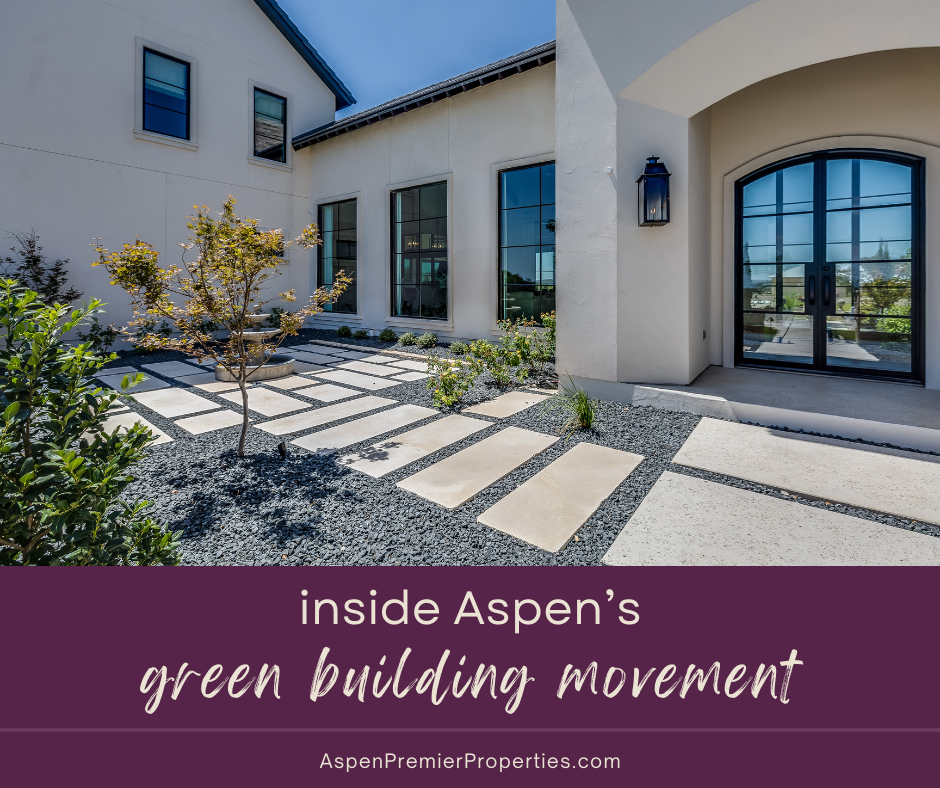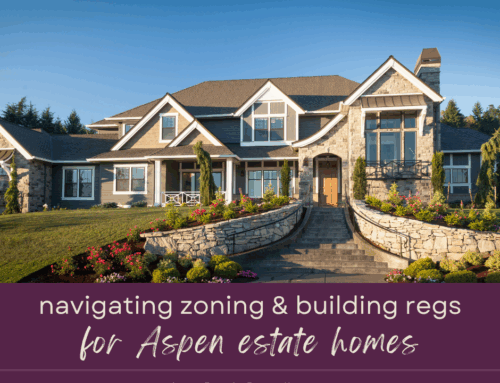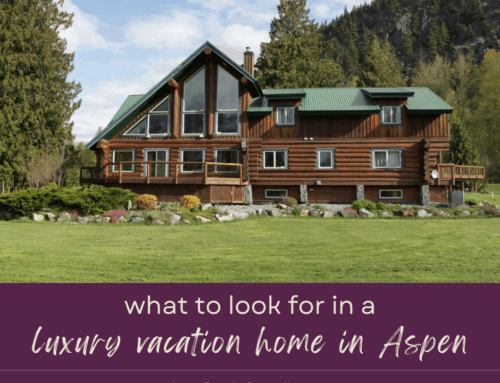Aspen has always been known for its natural beauty—but in recent years, it’s also become a leader in sustainable luxury real estate. As high-end buyers become more environmentally conscious, builders, architects, and developers in Aspen are embracing green building practices. These luxury homes are not just energy-efficient—they’re beautiful, high-performing, and built to blend with the surrounding landscape.
Inside Aspen’s Green Building Movement for Luxury Homes
From advanced energy systems to eco-friendly materials, Aspen’s luxury market is evolving with the environment in mind. This guide explains the following:
-
What defines a green luxury home in Aspen
-
Energy-efficient technologies and building systems
-
Sustainable materials and responsible design
-
Certification programs and local building codes
-
Why green homes hold long-term value in Aspen
Here’s a closer look at each.
What Defines a Green Luxury Home in Aspen
Green building in Aspen focuses on efficiency, sustainability, and environmental impact—without sacrificing comfort or design. In the luxury segment, this often means homes that are:
-
Designed to reduce energy and water usage
-
Built using sustainably sourced or recycled materials
-
Oriented and constructed to minimize environmental disruption
-
Equipped with smart systems that monitor and manage resource use
These homes are designed for longevity, resilience, and seamless indoor-outdoor living. Many include wellness features such as clean air systems, water purification, and natural lighting to support physical and mental well-being.
In Aspen’s high-end neighborhoods, green design is a major selling point—not only for personal values but also for long-term investment. You can explore listings of Aspen real estate that highlight sustainable features.
Energy-Efficient Technologies and Building Systems
Luxury green homes in Aspen typically include state-of-the-art energy systems. These may include:
-
Solar panels: Integrated into roofs or installed as standalone systems, often offsetting a significant portion of energy usage
-
Geothermal heating and cooling: Efficient systems that use the earth’s temperature to regulate indoor climate
-
Radiant floor heating: Keeps homes comfortable during winter while using less energy than traditional forced-air systems
-
Smart thermostats and lighting: Automatically adjust for efficiency and can be controlled remotely
-
Battery storage: Allows solar-powered homes to store energy for nighttime or outages
These technologies not only reduce utility bills but also reduce the carbon footprint of large homes—especially important in Aspen’s sensitive mountain environment.
You can learn more about energy-efficient systems in residential construction by visiting energy.gov.
Sustainable Materials and Responsible Design
Aspen builders are increasingly turning to sustainable materials that reduce environmental impact and offer long-term durability. These include:
-
Reclaimed wood: Sourced from old barns, industrial buildings, or fallen trees, and used for beams, floors, or siding
-
Recycled steel and concrete: Reduce construction waste and add strength to structural components
-
Low-VOC paints and sealants: Improve indoor air quality and reduce off-gassing
-
Locally sourced stone: Minimizes transportation emissions and blends naturally with the surroundings
Homes are also designed to work with the landscape rather than against it. That means preserving existing trees, minimizing grading, and orienting the home to take advantage of natural light and passive solar heating.
Many luxury buyers in Aspen now request design-build teams that specialize in green architecture, ensuring that both aesthetic goals and sustainability standards are met.
Certification Programs and Local Building Codes
Aspen and Pitkin County have progressive green building regulations in place. The Community Development Department oversees energy efficiency standards and enforces strict environmental guidelines.
In addition to meeting local requirements, many homes pursue third-party certifications such as:
-
LEED (Leadership in Energy and Environmental Design): A globally recognized green building certification
-
Passive House: Focuses on energy performance and airtight construction
-
WELL Building Standard: Emphasizes health, wellness, and comfort within the home
-
National Green Building Standard (NGBS): Tailored for residential construction in the U.S.
These certifications not only add credibility and appeal for resale but also provide assurance that the home was built with both performance and responsibility in mind.
Why Green Homes Hold Long-Term Value in Aspen
Sustainability isn’t just a trend—it’s a long-term shift in how luxury buyers view quality. Green homes in Aspen tend to hold their value well because they offer benefits on multiple fronts:
-
Lower operating costs: Energy-efficient homes reduce monthly expenses
-
Healthier indoor environments: Clean air, water, and materials improve overall wellness
-
Future-proofing: As codes tighten and buyer preferences evolve, green homes are more likely to meet future standards
-
Marketability: Green features often become key differentiators in luxury real estate marketing
Buyers are increasingly asking for homes that reflect both their taste and their values. A REALTOR® with experience in sustainable properties can help you identify homes that meet these criteria—or guide you through building one from the ground up.
FAQ About Green Luxury Homes in Aspen
Check out these commonly asked questions about sustainable homebuilding and buying in Aspen. If you don’t see your question here, please call our office and we’ll find you the answers you need.
Are Green Luxury Homes More Expensive to Build?
They can cost more upfront, but many features—like solar or geothermal systems—reduce long-term expenses. Incentives and tax credits may also help offset costs.
Do Green Homes Resell Well in Aspen?
Yes. Demand for energy-efficient, environmentally friendly homes is rising, especially among younger high-net-worth buyers and second-home owners.
Can I Retrofit an Existing Home to Make It More Green?
Absolutely. Many homeowners update systems like HVAC, insulation, lighting, and windows to improve efficiency and reduce environmental impact.
Are There Green Building Requirements in Aspen?
Yes. Aspen and Pitkin County have specific codes that govern energy use, insulation, and sustainable construction. Your REALTOR® and builder can guide you through them.
How Do I Know if a Home Is Truly Energy-Efficient?
Look for third-party certifications like LEED or Passive House, or ask for utility records, HERS scores, and details about insulation, HVAC systems, and materials.
Aspen’s green building movement is redefining what luxury means—pairing elegance and performance with sustainability and responsibility. Whether you’re looking to buy or build, a well-designed green home in Aspen offers more than prestige—it offers peace of mind, lower environmental impact, and long-term value in one of the most beautiful places on Earth.
Get a FREE CMA on your home in 24hrs or less!
It's a SELLERS Market! Even if you are even just THINKING about selling, knowing what your home's TRUE market value is valuable information. Fill in your info below and we will send you a complete Market Value Report that shows you what it is REALLY worth in today's market.
Are You Selling or Buying a Home in Aspen?
If you’re ready to sell your home in Aspen, Woody Creek, Basalt, Carbondale or Snowmass, we may be able to help you.
Get in touch with us right now to find out how much your home is worth – and discover how we’ll be able to help you sell it quickly and for top dollar.
If you’re also looking for a home for sale in Aspen or a nearby community, check out our listings by price in the table below.
Aspen Homes for Sale by Price
| $200k to $300k | $300k to $400k | $400k to $500k |
| $500k to $600k | $600k to $700k | $700k to $800k |
| $800k to $900k | $900k to $1 million | Over $1 million |
Error 401: Access key is invalid or has been revoked, please ensure there are no spaces in your key.
If the problem persists, please reset your API key in the IDX Broker Dashboard, or contact help@idxbroker.com















